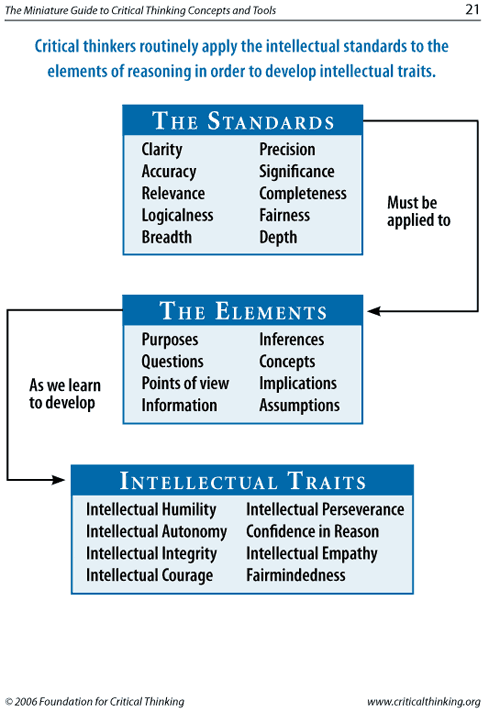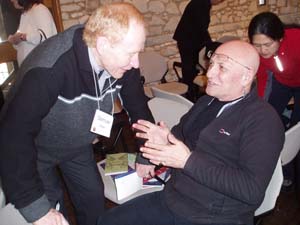The 28th Annual
International Conference on Critical Thinking Conference Theme:
The Art of Teaching for Intellectual Engagement
July 21-24, 2008 - Preconference: July 19-20
THIS EVENT HAS CONCLUDED
All new conference participants are strongly encouraged to attend one of the pre-conference sessions, as each of these sessions will provide an introduction to the most fundamental concepts in critical thinking prior to the conference. These sessions will lay the groundwork for all other conference sessions, and will prepare you for the deeper and broader work of the conference. These *pre-conference sessions are therefore especially recommended for those new to the conference. However, returning registrants will benefit from them as well.
{"id":500,"title":"","author":"","content":"<div style=\"float: right;\"><img src=\"https://www.criticalthinking.org/image/pimage/Richard-Gerald-Linda.jpg\" alt=\"\" /><br /> Richard Linda and Gerald</div>\r\n<div style=\"padding: 5px; background-color: #99ccff; font-weight: bold;\"><span>Every session will be designed to model effective instruction that systematically engages the intellect of students.<br /> *The Preconference Sessions are two days.&nbsp; When registering you will choose one session below for both days</span></div>\r\n<p><br /> <strong><span style=\"color: #000080;\">Choose One of the Following Sessions:<br /> </span></strong> <em><br /> </em></p>\r\n<p><a href=\"#1916\"><span style=\"color: #000080;\">Taking Initial Ownership of the Foundations of Critical Thinking and the Art of Instruction</span></a><strong><br /> </strong><strong>Dr. Gerald Nosich</strong></p>\r\n<p><a href=\"#1917\"><span style=\"color: #000080;\"><span>Socratic Questioning: Formulating and Asking Questions Utilizing the Tools of Critical Thinking</span></span></a><br /> <strong>Dr. Richard Paul</strong></p>\r\n<p><span><a href=\"#1918\"><span style=\"color: #000080;\">Critical Thinking: The Key to Survival in a World of Accelerating Change, Intensifying Complexity and Increasing Danger</span></a><br /> </span><strong>Dr. Linda Elder</strong></p>\r\n<p><strong><br /> </strong></p>\r\n<hr />\r\n<p><br style=\"clear: both;\" /></p>","public_access":"1","public_downloads":"1","sku":"","files":{},"images":{}}
An Introduction to the Fundamentals of Critical Thinking: Critical Thinking Across the Curriculum
This session will introduce you to the basic components of critical thinking, ways to build those components into the design of what you teach, and ways to make that design effective. In all conference sessions, we understand critical thinking not as something additional to content, but rather as skills, insights, and values integral to understanding and internalizing content. We focus, therefore, on illustrating how students can come to see what they are learning not as random bits and pieces of information to be memorized, but as a system with a definite set of logical relationships, an organized structure of concepts, principles, and understandings they must think their way through in order to learn content.
{"id":501,"title":"An Introduction to the Fundamentals of Critical Thinking: Critical Thinking Across the Curriculum","author":"Dr. Gerald Nosich","content":"<p>This session will introduce you to the basic components of critical thinking, ways to build those components into the design of what you teach, and ways to make that design effective. In all conference sessions, we understand critical thinking not as something additional to content, but rather as skills, insights, and values integral to understanding and internalizing content. We focus, therefore, on illustrating how students can come to see what they are learning not as random bits and pieces of information to be memorized, but as a system with a definite set of logical relationships, an organized structure of concepts, principles, and understandings they must think their way through in order to learn content.<br style=\"clear: both;\" /></p>","public_access":"1","public_downloads":"1","sku":"","files":{},"images":{}}
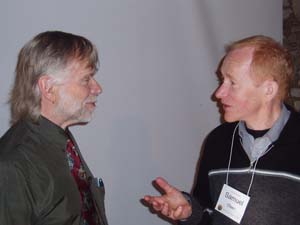 All thinking is driven by questions. Good questions generate good thinking. Bad questions generate bad thinking. Deep questions, deep thinking. No questions, no thinking. To think well about thinking we need to learn how to ask questions that take thinking apart and reveal to us how the parts of our thinking are functioning together. In this session, Richard Paul will provide an introduction to the theory and practice of Socratic Questioning, through emphasis on the analysis and assessment of reasoning, as well as the intellectual traits. Participants will be engaged in Socratic dialogue, and will gain introductory experience in Socratic questioning, that with practice can lead to an increasingly richer understanding of the power inherent in disciplined questioning as a tool of both teaching and learning.
All thinking is driven by questions. Good questions generate good thinking. Bad questions generate bad thinking. Deep questions, deep thinking. No questions, no thinking. To think well about thinking we need to learn how to ask questions that take thinking apart and reveal to us how the parts of our thinking are functioning together. In this session, Richard Paul will provide an introduction to the theory and practice of Socratic Questioning, through emphasis on the analysis and assessment of reasoning, as well as the intellectual traits. Participants will be engaged in Socratic dialogue, and will gain introductory experience in Socratic questioning, that with practice can lead to an increasingly richer understanding of the power inherent in disciplined questioning as a tool of both teaching and learning.
{"id":502,"title":"Socratic Questioning: Formulating and Asking Questions Utilizing the Tools of Critical Thinking ","author":"Dr. Richard Paul","content":"<p><img src=\"https://www.criticalthinking.org/images/P1010039.jpg\" alt=\"\" hspace=\"8\" align=\"left\" />All thinking is driven by questions. Good questions generate good thinking. Bad questions generate bad thinking. Deep questions, deep thinking. No questions, no thinking. To think well about thinking we need to learn how to ask questions that take thinking apart and reveal to us how the parts of our thinking are functioning together. In this session, Richard Paul will provide an introduction to the theory and practice of Socratic Questioning, through emphasis on the analysis and assessment of reasoning, as well as the intellectual traits. Participants will be engaged in Socratic dialogue, and will gain introductory experience in Socratic questioning, that with practice can lead to an increasingly richer understanding of the power inherent in disciplined questioning as a tool of both teaching and learning.<br style=\"clear: both;\" /></p>","public_access":"1","public_downloads":"1","sku":"","files":{},"images":{}}
Critical Thinking: The Key to Survival in a World of Accelerating Change,
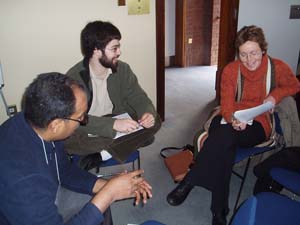 Intensifying Complexity, and Increasing Danger
Intensifying Complexity, and Increasing Danger
Dr. Linda Elder
The world is swiftly changing and with each day the pace quickens. The pressure to respond intensifies. New global realities are rapidly working their way into the deepest structures of our lives: economic, social, cultural, political, and environmental realities - realities with profound implications for thinking and learning, business and politics, human rights and human conflicts. These realities are becoming increasingly complex; many represent significant dangers and threats. And they all turn on the powerful dynamic of accelerating change.
Can we deal with incessant and accelerating change and complexity without revolutionizing our thinking? Traditionally our thinking has been designed for routine, for habit, for automation and fixed procedure. We learned how to do our job once, and then we used what we learned over and over. But the problems we now face, and will increasingly face, require a radically different form of thinking, thinking that is more complex, more adaptable, more sensitive to divergent points of view. The world in which we now live requires that we continually relearn, that we routinely rethink our decisions, that we regularly reevaluate the way we work and live. In short, there is a new world facing us, one in which the power of the mind to command itself, to regularly engage in self-analysis, will increasingly determine the quality of our work, the quality of our lives, and perhaps even, our very survival.
If we are to take up the challenge of becoming critical thinkers, we face a battery of hitherto unanswered questions, questions at the heart of this session. This question-centered agenda provides the impetus for reformulating our worldview. Through it we can appreciate the intellectual work required to change our thinking in foundational ways. Through it we can grasp the need to regularly re-examine the extent of our ignorance. Through it we can grasp the need for regular exercise of disciplined thinking. Through it we can understand the long-term nature of intellectual development, social change, and personal growth and transformation.
{"id":503,"title":"Critical Thinking: The Key to Survival in a World of Accelerating Change,","author":"","content":"<p><span><img src=\"https://www.criticalthinking.org/images/P1010003.jpg\" alt=\"\" hspace=\"8\" vspace=\"10\" align=\"right\" /></span><strong class=\"head\">Intensifying Complexity, and Increasing Danger</strong><br /> &nbsp;&nbsp;&nbsp; <span class=\"f2\"><strong>Dr. Linda Elder</strong></span><span><br /> The world is swiftly changing and with each day the pace quickens. The pressure to respond intensifies. New global realities are rapidly working their way into the deepest structures of our lives: economic, social, cultural, political, and environmental realities - realities with profound implications for thinking and learning, business and politics, human rights and human conflicts. These realities are becoming increasingly complex; many represent significant dangers and threats. And they all turn on the powerful dynamic of accelerating change. </span><br /> <br /> <span>Can we deal with incessant and accelerating change and complexity without revolutionizing our thinking? Traditionally our thinking has been designed for routine, for habit, for automation and fixed procedure. We learned how to do our job once, and then we used what we learned over and over. But the problems we now face, and will increasingly face, require a radically different form of thinking, thinking that is more complex, more adaptable, more sensitive to divergent points of view. The world in which we now live requires that we continually relearn, that we routinely rethink our decisions, that we regularly reevaluate the way we work and live. In short, there is a new world facing us, one in which the power of the mind to command itself, to regularly engage in self-analysis, will increasingly determine the quality of our work, the quality of our lives, and perhaps even, our very survival. </span> <br /> <br /> <span>If we are to take up the challenge of becoming critical thinkers, we face a battery of hitherto unanswered questions, questions at the heart of this session. This question-centered agenda provides the impetus for reformulating our worldview. Through it we can appreciate the intellectual work required to change our thinking in foundational ways. Through it we can grasp the need to regularly re-examine the extent of our ignorance. Through it we can grasp the need for regular exercise of disciplined thinking. Through it we can understand the long-term nature of intellectual development, social change, and personal growth and transformation. </span><br style=\"clear: both;\" /></p>","public_access":"1","public_downloads":"1","sku":"","files":{},"images":{}}
{"id":504,"title":"","author":"","content":"<p><img style=\"float: right;\" src=\"https://www.criticalthinking.org/image/pimage/Concepts_Tools-8.gif\" alt=\"\" /><br /> <span style=\"color: #000080;\"><strong>What Each Preconference Session Has in Common</strong></span><br /> <br /> <span>The preconference sessions will introduce you to the essential concepts in critical thinking from a slightly difference angle.&nbsp;All three sessions will provide an introduction to three dimensions of critical thinking: the analysis of thinking, the assessment of thinking, and the development of intellectual virtues or dispositions. <br /> <img src=\"https://www.criticalthinking.org/images/P1010031.jpg\" alt=\"\" hspace=\"0\" vspace=\"10\" /><br /> <img src=\"https://www.criticalthinking.org/images/P1010037.jpg\" alt=\"\" hspace=\"0\" vspace=\"10\" /><br /> </span> <span style=\"color: #000080;\"><strong><span><br /> </span></strong></span><br style=\"clear: both;\" /></p>","public_access":"1","public_downloads":"1","sku":"","files":{},"images":{}}
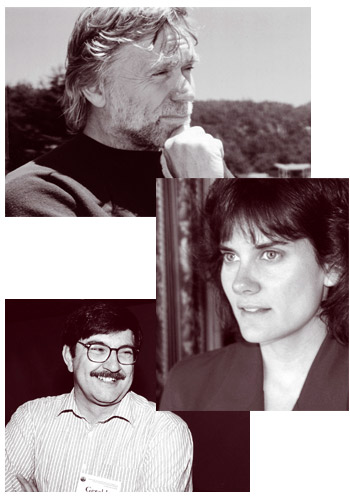
 All thinking is driven by questions. Good questions generate good thinking. Bad questions generate bad thinking. Deep questions, deep thinking. No questions, no thinking. To think well about thinking we need to learn how to ask questions that take thinking apart and reveal to us how the parts of our thinking are functioning together. In this session, Richard Paul will provide an introduction to the theory and practice of Socratic Questioning, through emphasis on the analysis and assessment of reasoning, as well as the intellectual traits. Participants will be engaged in Socratic dialogue, and will gain introductory experience in Socratic questioning, that with practice can lead to an increasingly richer understanding of the power inherent in disciplined questioning as a tool of both teaching and learning.
All thinking is driven by questions. Good questions generate good thinking. Bad questions generate bad thinking. Deep questions, deep thinking. No questions, no thinking. To think well about thinking we need to learn how to ask questions that take thinking apart and reveal to us how the parts of our thinking are functioning together. In this session, Richard Paul will provide an introduction to the theory and practice of Socratic Questioning, through emphasis on the analysis and assessment of reasoning, as well as the intellectual traits. Participants will be engaged in Socratic dialogue, and will gain introductory experience in Socratic questioning, that with practice can lead to an increasingly richer understanding of the power inherent in disciplined questioning as a tool of both teaching and learning. Intensifying Complexity, and Increasing Danger
Intensifying Complexity, and Increasing Danger